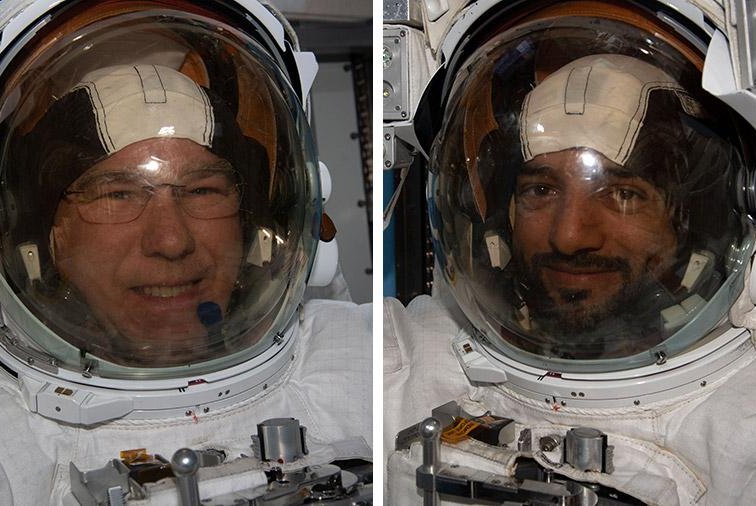
NASA astronaut Steve Bowen and UAE astronaut Sultan Alneyadi prepare for a spacewalk outside the International Space Station on Friday. Photo courtesy of NASA
April 28 (UPI) -- NASA astronaut Steve Bowen and UAE astronaut Sultan Alneyadi embarked on a spacewalk from the International Space Station on Friday morning to do preliminary work for upgrading the solar arrays that power the station.
The astronauts, who stepped out of the station at 9:11 a.m. EDT Friday, are tasked with preparing the station's starboard truss for panel installation and removing S-band antenna equipment from the station's exterior to bring it inside for upgrades.
The work is expected to take about 6.5 hours.
NASA is providing live coverage of the spacewalk on the agency's website.

UAE Astronaut Sultan Alneyadi gives a thumbs-up to friends and family before launching to the International Space Station from Kennedy Space Center in Florida on March 1. File Photo by Joe Marino/UPI | License Photo
Four new solar arrays -- which convert energy from the sun into electricity to power the space station -- have been installed, with two more to come.
In February, NASA's Nicole Mann and the Japanese Space Agency's Koichi Wakata finished installing a mounting platform for them.
On Tuesday, cosmonauts Dmitry Petelin and Sergey Prokopyev delayed a spacewalk to help detach and move an airlock from one station module to another. Russian space agency Roscosmos decided it needed more time to study the tasks.
It has been rescheduled for Wednesday.

NASA astronaut Steve Bowen waves to friends and family members before launching to the International Space Station from Kennedy Space Center in Florida on March 1. File Photo by Joe Marino/UPI | License Photo
Russia to stay on International Space Station through 2028

NASA announced that Russia will remain with the International Space Station through 2028. File Photo courtesy of NASA
April 28 (UPI) -- Russia has committed it will remain on the International Space Station until 2028, backing away from a plan to leave the low-Earth orbiting laboratory next year, according to NASA.
NASA on Wednesday announced Russia would "support continued station operations" for another five years, while the United States, Japan, Canada and participating countries of the European Space Agency offered a longer commitment through 2030.
"The International Space Station partners have committed to extending the operations of this unique platform in low Earth orbit where, for more than 22 years, humans have lived and worked for the benefit of humanity, conducting cutting-edge science and research in microgravity," NASA said.
"NASA will continue to work with its partner agencies to ensure an uninterrupted presence in low Earth orbit, as well as a safe and orderly transition from the space station to commercial platforms in the future."
Last July, the new head of the Russian Space Agency, Roscomos, Yury Borisov, said it would leave the ISS and build its own space laboratory at a cost of $6 billion. The announcement came five months into Russia'sinvasion of Ukraine, leading the United States and the governments of its space partners to respond with financial sanctions.
China built its own space station, and a crew spent their first six-month trip on it in February.
Russia has been one of the leading space agencies since the start of its construction in 1998.
"The International Space Station is an incredible partnership with a common goal to advance science and exploration," Robyn Gatens, director of the International Space Station Division at NASA headquarters in Washington, D.C., said.
"Extending our time aboard this amazing platform allows us to reap the benefits of more than two decades of experiments and technology demonstrations, as well as continue to materialize even greater discoveries to come."

NASA announced that Russia will remain with the International Space Station through 2028. File Photo courtesy of NASA
April 28 (UPI) -- Russia has committed it will remain on the International Space Station until 2028, backing away from a plan to leave the low-Earth orbiting laboratory next year, according to NASA.
NASA on Wednesday announced Russia would "support continued station operations" for another five years, while the United States, Japan, Canada and participating countries of the European Space Agency offered a longer commitment through 2030.
"The International Space Station partners have committed to extending the operations of this unique platform in low Earth orbit where, for more than 22 years, humans have lived and worked for the benefit of humanity, conducting cutting-edge science and research in microgravity," NASA said.
"NASA will continue to work with its partner agencies to ensure an uninterrupted presence in low Earth orbit, as well as a safe and orderly transition from the space station to commercial platforms in the future."
Last July, the new head of the Russian Space Agency, Roscomos, Yury Borisov, said it would leave the ISS and build its own space laboratory at a cost of $6 billion. The announcement came five months into Russia'sinvasion of Ukraine, leading the United States and the governments of its space partners to respond with financial sanctions.
China built its own space station, and a crew spent their first six-month trip on it in February.
Russia has been one of the leading space agencies since the start of its construction in 1998.
"The International Space Station is an incredible partnership with a common goal to advance science and exploration," Robyn Gatens, director of the International Space Station Division at NASA headquarters in Washington, D.C., said.
"Extending our time aboard this amazing platform allows us to reap the benefits of more than two decades of experiments and technology demonstrations, as well as continue to materialize even greater discoveries to come."
No comments:
Post a Comment